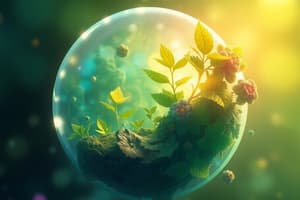Podcast
Questions and Answers
What is the basic unit of life?
What is the basic unit of life?
- Organ
- Atom
- Tissue
- Cell (correct)
Which organelle is known as the powerhouse of the cell?
Which organelle is known as the powerhouse of the cell?
- Golgi apparatus
- Ribosome
- Mitochondria (correct)
- Nucleus
What is the chemical formula for water?
What is the chemical formula for water?
- O2
- H2O2
- H2O (correct)
- CO2
Which gas do plants absorb during photosynthesis?
Which gas do plants absorb during photosynthesis?
What is the pH level of pure water?
What is the pH level of pure water?
Which vitamin is produced when the skin is exposed to sunlight?
Which vitamin is produced when the skin is exposed to sunlight?
What is the main component of the cell membrane?
What is the main component of the cell membrane?
Which type of bond involves the sharing of electron pairs?
Which type of bond involves the sharing of electron pairs?
Which organelle is primarily responsible for producing energy in the cell?
Which organelle is primarily responsible for producing energy in the cell?
Which organ is vital for detoxifying chemicals in the body?
Which organ is vital for detoxifying chemicals in the body?
What gas is found in the highest concentration in the Earth's atmosphere?
What gas is found in the highest concentration in the Earth's atmosphere?
Which of the following resources is classified as non-renewable?
Which of the following resources is classified as non-renewable?
What is the correct chemical symbol for gold?
What is the correct chemical symbol for gold?
Which part of the cell is responsible for containing the genetic material?
Which part of the cell is responsible for containing the genetic material?
What is the primary function of the respiratory system?
What is the primary function of the respiratory system?
Which of the following is an example of a carbohydrate?
Which of the following is an example of a carbohydrate?
Flashcards are hidden until you start studying
Study Notes
Biology
- The basic unit of life is the cell.
- Mitochondria are known as the powerhouse of the cell.
- Plants absorb carbon dioxide during photosynthesis.
- The pH level of pure water is 7.
- Argon is a noble gas.
- Red blood cells carry oxygen.
- Mars is known as the Red Planet.
- The largest organ in the human body is the skin.
- Hydrogen has the atomic number 1.
- Plants make their food through photosynthesis.
- The cerebellum is responsible for balance in the brain.
- Lipids are the main component of the cell membrane.
- Vitamin D is produced when skin is exposed to sunlight.
- A grasshopper is a primary consumer.
- The kidneys filter blood.
- Covalent bonds involve the sharing of electron pairs.
- The liver detoxifies chemicals.
- Nitrogen is the most abundant gas in Earth's atmosphere.
- Coal is a non-renewable resource.
- The chemical symbol for gold is Au.
- The nucleus of a cell contains the genetic material.
- The respiratory system exchanges gases.
- Living organisms can reproduce, move, and grow.
- An atom is the smallest unit of matter.
- The stomach is primarily responsible for digestion.
- The skeletal system protects organs.
- Glucose is a type of carbohydrate.
- The immune system protects against disease.
- Solar energy is a renewable resource.
- The digestive system breaks down food.
- Proteins store energy, provide structure, and transport substances.
- The circulatory system transports nutrients.
Chemistry
- The chemical formula for water is H₂O.
Physics
- The speed of light is 300,000 km/s.
General Knowledge
- The powerhouse of the cell is the mitochondria (repeated for emphasis).
Studying That Suits You
Use AI to generate personalized quizzes and flashcards to suit your learning preferences.




